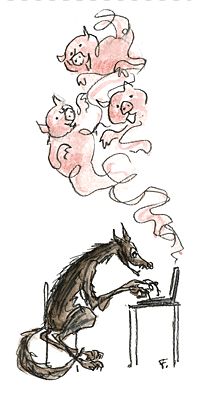“A writer is someone who has taught his mind to misbehave.”—Oscar Wilde
One of my favorite Oscar Wilde quotes identifies a writer as someone who has trained his or her mind to misbehave. I chose it as the representative quotation in the ‘Who Says?’ column on my blog last week, and I’ve left it up for another week because it stimulated so many of my neurons in a familiar but long-forgotten way. I remember thinking about the Wilde assertion when I was very young and still believing I would be a writer myself someday. Those early years in one’s youth can often be associated with the thrill of misbehaving, but culture and nature seem to push very hard to squeeze all the joy out of disobedience, forcing an abhorrence of risk-taking on many of us before we understand the consequences of losing the thrill of experimentation.
As life and the desire to earn a living, please others, and ‘accomplish something’ closed in on my dream of becoming a writer, I thought I’d found my truth in the fact that you had to learn the rules before you could throw them away. The trouble with discipline, at least for me, was that I found it such a difficult adjustment that I couldn’t let it go once I’d gotten there. I forgot how to play, act and think like a child; and I’d certainly lost all ability to write with a child’s abandon. I suppose that’s why I also lost interest in Wilde’s contention that the mind had to be free of controls to write. Being reminded of it now rings a bell proclaiming the partnership between the imagination and the written word. I’ve had to relearn that truth lately, too. I have a feeling it’s the same for a composer, though not so much for the other arts. I’m fairly sure an artist needs to put brush to canvas (or whatever medium is the chosen one) to create an actual work, but a writer can create quite a long and complicated piece entirely in the mind before putting it down for posterity. I write all the time in my head now, just as I did as a child, and breaking all sorts of emotional and cognitive rules while I do it only makes the finished product more valuable.
I remember our 39th president of the United States, Jimmy Carter, claimed that thinking something didn’t make it so. His reference was to imaginary marital infidelity, as I recall, and I also remember thinking his reasoning was extremely suspect; probably because I had a faint recollection of how powerful the mind could be. At one point I’d certainly believed that imagining something was only one step away from making it so, but naturally the adult world (and Jimmy Carter!) worked hard to disaffect me of that idea; quite successfully, I must admit. That, of course, was because I was working so hard not to let my own mind misbehave, which is certain death to the creative spirit when all the oxygen is slowly removed from its environment.
Teaching the mind to take a dare again much later in life is not easy, but like so many things we flirt with early-on, the psychic memory can definitely be reactivated just as successfully as muscle memory; in fact, maybe much better. With continuous exposure to the craft and the pleasure it brings, I’ve found it easier and easier to let my mind break the rules and think like a child-writer again. A wise friend of mine suggested I not go back to writing classes when I decided to return to the joys of the art form. “Write because you want to, the way you did as a child; but not because someone tells you to,” she said. I didn’t have the confidence to strike out on my own, then. But with Oscar Wilde’s blessing in mind now to loosen the ties that bind, I’ve come to appreciate once more how powerful and essential the inner eye is to a writer; and how important it is to take off the blinders.
I know it takes work to unlearn all the mistakes people teach you, and especially the ones you taught yourself, but the effort is worth it if you want the thrill of risk-taking again. Nothing makes you feel younger, stronger or more exhilarated. If you want to free up the tightness in your head, you have to let your mind misbehave; like a writer’s.

